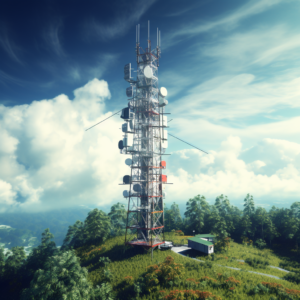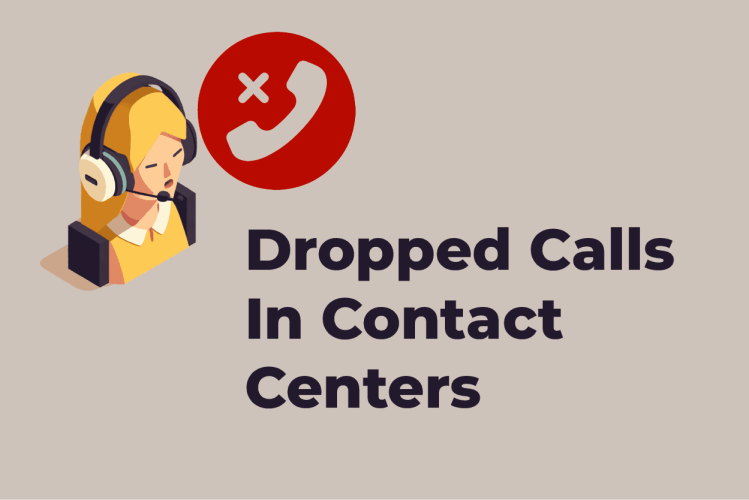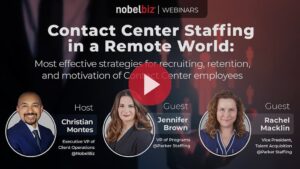Ah, the dreaded dropped call – the arch-nemesis of every contact center agent’s productivity and the ultimate buzzkill in the world of customer service. Picture this: you’re right in the middle of resolving a customer’s epic quest for a solution, and just as you’re about to unveil the treasure trove of answers, poof! The call vanishes into thin air, leaving you staring at your phone like it’s some sort of cosmic joke.
Dropped calls are a bit like sneezing during an important meeting – they disrupt the flow, leave everyone feeling awkward, and often require a do-over. But in the contact center realm, they’re not just a minor inconvenience; they’re a productivity vampire. Think about it: when a call drops, it’s not just about reconnecting and getting back to the conversation. It’s about potentially losing vital information, extending call times, and frustrating both your customers and your hard-working agents. For call centers, this scenario isn’t just a minor inconvenience—it can result in substantial losses.
What is a Dropped Call?
 A dropped call is a term used predominantly in the telecommunications industry to describe a situation where an ongoing telephone conversation is unintentionally disconnected due to technical or other reasons. This disconnection isn’t initiated by any of the participants in the call, making it an unexpected and often frustrating occurrence.
A dropped call is a term used predominantly in the telecommunications industry to describe a situation where an ongoing telephone conversation is unintentionally disconnected due to technical or other reasons. This disconnection isn’t initiated by any of the participants in the call, making it an unexpected and often frustrating occurrence.
To better understand this, imagine you’re engrossed in an important conversation with a friend over the phone, discussing weekend plans. Suddenly, without warning or any action on your part, the call ends. You’re left in silence, holding a phone that’s no longer connected. This unexpected termination of the conversation is what’s termed as a ‘dropped call’.
According to HubSpot, the acceptable rate of dropped calls for a call center varies by industry, but on average, most call centers should have a call abandonment rate between 5% and 8%. A high call abandonment rate is 10% or more.
Dropped calls are more than just technical glitches; they disrupt the customer experience, leading to disgruntled customers, extended call times, and decreased productivity. In a call center, they’re the stumbling blocks to trust and efficiency. – Brad Butler, Contact Center Software Consultant @NobelBiz
Common Causes of Dropped Calls in Call Centers
In a call center environment, every interaction with a customer is an opportunity either to build a lasting relationship or, unfortunately, to alienate someone. A dropped call, which is an unintended interruption in the conversation, can be detrimental to the customer experience. From the perspectives of both call centers and customers, here are the common causes for these unwanted disconnections:
Technical Factors
- Weak Signals or Connectivity Issues:
- Call Center Perspective: If a call center relies on Voice over Internet Protocol (VoIP) technology for its operations, it’s crucial to maintain a strong and stable internet connection. Weak internet connectivity can lead to calls dropping in the middle of conversations.
- Customer Perspective: Customers might be calling from areas with weak cellular reception or from a landline experiencing interference. This can result in the call disconnecting unexpectedly.
- Outdated Infrastructure or Equipment:
- Call Center Perspective: Utilizing outdated hardware or not updating phone system software can lead to performance issues, which can cause dropped calls. Over time, wear and tear on headsets, phones, and other equipment can also negatively impact call quality.
- Customer Perspective: Customers using older cell phones or damaged equipment might experience more frequent call drops.
- Software Glitches:
- Call Center Perspective: Call centers often use advanced software for call routing, monitoring, and management. Bugs or glitches in this software can lead to calls being unintentionally terminated.
- Customer Perspective: If a customer is using VoIP services or mobile apps to make calls, software bugs on their end can also contribute to call drops.
NobelBiz OMNI+ steps in as a comprehensive cloud solution, offering contact centers a lifeline when dealing with the vexing issue of dropped calls. This versatile platform simplifies operations with a unified dashboard for voice and digital channels, ensuring consistent customer interactions. Moreover, OMNI+ guarantees 99.9% uptime through server redundancy, erasing concerns about downtime.
Our solution provides pre-built integrations with popular third-party tools crucial for contact center operations, such as CRMs, payment processors, and database management systems. OMNI+ stands as a practical and dependable ally for contact centers, addressing the challenges posed by dropped calls while streamlining operations and enhancing customer experiences.
Human Factors
- Operator Error:
- Call Center Perspective: New or inadequately trained operators might accidentally disconnect calls. This could be due to unfamiliarity with the call system or a misstep in handling multiple calls simultaneously.
- Customer Perspective: The customer may think the operator intentionally disconnected the call, leading to frustration and dissatisfaction.
- Accidental Hang-ups:
- Call Center Perspective: Operators, especially during high call volumes, might mistakenly press the wrong button, leading to an unintentional call termination.
- Customer Perspective: From a user’s side, they might accidentally hit the ‘end call’ button, especially on touchscreen phones, or the call might disconnect if the handset is placed too close to other electronic devices causing interference.
Dropped calls causing chaos in your contact center? Watch our on-demand webinar to unravel the mysteries behind them, including human factors like operator error and accidental hang-ups. Learn how to prevent call disconnects, boost customer satisfaction, and ensure staffing success. Don’t miss this chance – watch our free on-demand webinar now!
The Implications for Call Centers
Dropped calls in call centers aren’t just an inconvenience; they’re a disruption with far-reaching consequences. Beyond a mere call disconnect, they signify a breakdown in the customer service chain, with ripple effects across the board. From customer dissatisfaction to potential revenue loss, these implications underscore the critical need for a seamless and reliable communication system in today’s call center landscape. Here’s an in-depth exploration of the cascading effects dropped calls can have on call centers:
Lost Revenue
- Missed Sale Opportunities:
- Each time a call drops, especially in outbound call centers, there’s a lost chance of making a sale. Customers, when interrupted, might not have the patience to reconnect, causing potential revenue loss.
- Reduced Upsell and Cross-sell Opportunities:
- For inbound call centers, every interaction is an opportunity to upsell or cross-sell additional products or services. A dropped call can interrupt this process, causing the call center to miss out on these valuable opportunities.
- Increased Operational Costs:
- Call centers might need to make follow-up calls to customers whose calls were dropped, incurring extra costs both in terms of time and resources.
Customer Dissatisfaction
- Frustration from Repeated Interruptions:
- Imagine a customer explaining a complicated issue, and the call drops midway. Re-explaining or restarting the conversation can be frustrating, leading to dissatisfaction.
- Decreased Brand Loyalty:
- Consistent dropped calls can lead to a negative perception of the brand. Customers may feel the company doesn’t prioritize reliable communication, leading to decreased trust and loyalty.
- Negative Word of Mouth:
- Unsatisfied customers are more likely to share their negative experiences with peers, potentially driving away prospective customers.
Employee Morale and Productivity
- Handling Irate Customers:
- Agents often bear the brunt of a customer’s frustration from a dropped call, even if it’s a technical issue beyond their control. Consistently dealing with upset customers can be emotionally draining.
- Decreased Confidence:
- Continual technical issues can cause agents to lose confidence in their tools and systems, leading them to feel ill-equipped to perform their roles effectively.
- Reduced Productivity:
- Dropped calls mean agents might have to spend extra time making follow-up calls or documenting unfinished conversations. This diverts time from attending new customers, reducing overall productivity.
Dropped calls in contact centers are like missing puzzle pieces in a masterpiece – they disrupt the entire picture of seamless customer service, leaving behind gaps that impact both satisfaction and the bottom line. – Christian Montes, Executive Vice President of Client Operations @NobelBiz
Proactive Solutions to Prevent Dropped Calls
To tackle the dropped call dilemma head-on, call centers should embrace a proactive approach. Instead of reacting to the fallout, they should invest in prevention strategies. By identifying potential triggers, improving operator training, and ensuring robust call-handling procedures, call centers can significantly reduce the incidence of dropped calls. This forward-thinking mindset not only enhances customer satisfaction but also fortifies the foundation of a reliable communication ecosystem. Here’s how they can reduce the risk of dropped calls:
Upgrading Infrastructure
- Hardware Updates:
- Investing in modern telecommunication devices, routers, and servers ensures that the equipment isn’t a bottleneck. High-quality infrastructure supports stable connectivity and reduces call drops.
- Software Optimization:
- Keeping call center software updated ensures you benefit from the latest patches and optimizations. This not only reduces the risk of software-related call drops but also offers improved features and security.
Adequate Training
- Understanding Equipment:
- Proper training ensures that staff are familiar with the hardware they use daily, reducing the chances of unintentional disconnects due to mishandling.
- System Proficiency:
- When operators are well-versed with the call center software, they can handle calls efficiently, minimizing the risk of accidental hang-ups or system-related issues.

Watch this revealing podcast episode to optimize your agent training procedures: Benchmarking and Training in Today’s Contact Centers, with Bruce Belfiore
Proper Call Monitoring
- Real-time Monitoring Tools:
- Using real-time monitoring allows supervisors to identify issues as they happen. Early detection can mean timely intervention, possibly preventing a dropped call or quickly rectifying the situation.
Reactive Solutions to Address Dropped Calls
Even with proactive measures in place, dropped calls can occasionally happen. Here’s how call centers can react effectively:
Effective Callback Systems
- Immediate Callbacks:
- Having a system in place to immediately call back a customer if their call drops can reduce frustration. It demonstrates to the customer that their time and concerns are valued.
- Consistency in Interaction:
- Whenever possible, ensure that the callback comes from the same agent the customer was initially speaking to. This prevents the customer from having to re-explain their situation, offering a seamless experience.
Analyzing Data for Insights
- Identifying Patterns:
- Analyzing call data can reveal patterns or specific timeframes when dropped calls are more frequent. Recognizing these trends is the first step in addressing the root causes.
- Feedback and Continuous Improvement:
- Encourage both staff and customers to provide feedback regarding call quality. This firsthand input, combined with data analytics, can provide comprehensive insights into areas of improvement.
In the fight against dropped calls, the NobelBiz Voice Carrier Network becomes a global ally for contact centers. Seamlessly integrating with the NobelBiz OMNI+ platform, it fortifies the communication fortress.
With rock-solid redundancy, it guarantees uninterrupted connectivity and top-notch voice quality, addressing the root of dropped call challenges. Moreover, it simplifies compliance with TCPA regulations, providing essential legal support. Offering budget-friendly cost-per-minute rates tailored for high-volume call centers, this network empowers businesses to confront dropped call issues head-on. It also equips contact centers with productivity tools, including intelligent routing, web-based admin, and number provisioning. NobelBiz Voice Carrier Network, the guardian against dropped calls, ensures contact centers stay connected, compliant, and efficient.
Conclusion
 In conclusion, while preventing every single dropped call might not be feasible, a mix of proactive and reactive measures can significantly reduce their occurrence and impact. By prioritizing customer experience and continuously seeking improvement, call centers can ensure that communication remains smooth and efficient.
In conclusion, while preventing every single dropped call might not be feasible, a mix of proactive and reactive measures can significantly reduce their occurrence and impact. By prioritizing customer experience and continuously seeking improvement, call centers can ensure that communication remains smooth and efficient.
If you’re grappling with the vexing challenge of dropped calls in your contact center, rest assured that NobelBiz is here to provide the support you need. Our comprehensive solutions, like the NobelBiz Voice Carrier Network or NobelBiz OMNI+ cloud contact center software, are designed to tackle the issue head-on and ensure seamless, uninterrupted communication. Don’t let dropped calls hamper your operations – reach out to us today, and let’s work together to fortify your contact center against this common challenge. Your journey to reliable and efficient communication starts here.

Michael McGuire is a contact center industry expert with almost two decades of experience in the space. His experience includes roles as Director of Contact Center Digital Transformation at NobelBiz, and as Director of Operations at FLS Connect, managing multiple call centers. As President of Anomaly Squared and Targeted Metrics, Michael successfully transitioned companies into remote operations and significantly boosted revenues. With a strong background in customer service, leadership, strategic planning, and operations management, Michael excels in driving growth and innovation in the call center space.
Mike is also a proud Board Member for R.E.A.C.H Trade Group, promoting consumer protection and satisfaction and Co-host of the Off Skripted Podcast – a show about Life, Call Centers and everything in between.




